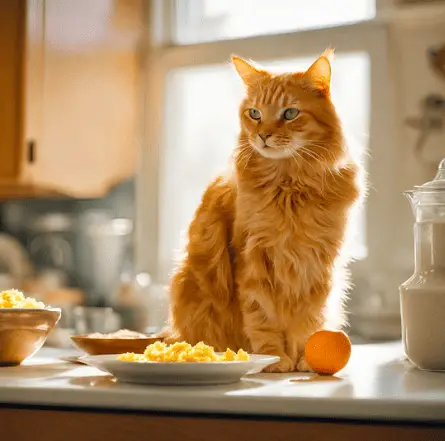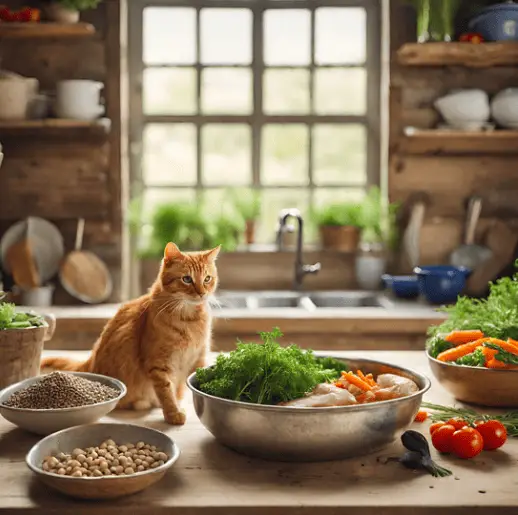
Did you know that eggs are a common and nutritious treat for cats? Contrary to popular belief, cats can safely enjoy scrambled eggs in moderation.
In this article, I’ll explore the truth about feline egg feasting, including the nutritional benefits, potential risks, and how to introduce eggs into your cat’s diet. We’ll also discuss signs of allergies or sensitivities and provide alternatives for those who prefer not to feed their cats scrambled eggs.
Let’s dive in and uncover the facts together!
KEY TAKEAWAY
Can cats eat scrambled eggs?
Yes, cats can safely eat scrambled eggs in moderation as an occasional treat. Ensure they are thoroughly cooked without added seasoning or ingredients harmful to cats.
The Nutritional Benefits of Eggs for Cats
I’ve always heard that feeding my cat scrambled eggs can be beneficial for their nutrition. As a cat owner, I wanted to dig deeper and find out the truth about the nutritional benefits of eggs for cats.
Eggs are a great source of protein for cats. Protein is essential for their overall health and development, as it helps to build and repair tissues. It also provides energy and supports their immune system. Scrambled eggs can be an excellent way to add some extra protein to your cat’s diet.
In addition to protein, eggs contain essential vitamins and minerals. They’re rich in vitamin A, which is important for maintaining good vision and a healthy coat. Eggs also provide vitamin D, which helps with calcium absorption and promotes strong bones. Other essential nutrients found in eggs include vitamin B12, selenium, and choline.
When feeding your cat scrambled eggs, it’s important to cook them thoroughly. Raw eggs can be risky as they may contain bacteria like Salmonella, which can cause foodborne illnesses. Cooking the eggs will eliminate any potential health risks.
While eggs can be a nutritious addition to your cat’s diet, it’s essential to remember that they should be given in moderation. Too many eggs can lead to an unbalanced diet and potentially cause digestive issues. It’s always best to consult with your veterinarian before making any significant changes to your cat’s diet.
Understanding the Risks of Feeding Cats Scrambled Eggs
Feeding cats scrambled eggs can potentially pose health risks if not cooked thoroughly. As a cat owner, I want to ensure that my feline friend stays healthy and safe, so it’s important to understand the potential risks associated with feeding them scrambled eggs. Here are three reasons why thorough cooking is crucial:
- Bacterial contamination: Raw or undercooked eggs can contain harmful bacteria like Salmonella, which can lead to food poisoning in cats. Cooking eggs thoroughly kills these bacteria, reducing the risk of infection.
- Nutrient imbalances: While eggs are a good source of protein and essential fatty acids for cats, they should be part of a balanced diet. Feeding too many scrambled eggs can disrupt the nutrient balance, leading to deficiencies or excesses in other essential nutrients.
- Allergic reactions: Some cats may be allergic to eggs, and feeding them scrambled eggs without knowing can trigger allergic reactions. Common symptoms include itching, vomiting, and diarrhea. Always introduce new foods gradually and monitor your cat’s response.
To ensure the safety of our cats, it’s important to cook scrambled eggs thoroughly before feeding them. This way, we can provide a nutritious treat without compromising their health.
How to Safely Introduce Scrambled Eggs Into Your Cat’s Diet
Considering the potential risks, slowly introducing small portions of thoroughly cooked scrambled eggs into your cat’s diet can be a safe and nutritious addition. Cats are obligate carnivores, meaning their diet should primarily consist of meat. However, eggs can provide a valuable source of protein and essential nutrients for your feline friend.
When introducing scrambled eggs to your cat, it’s important to ensure they’re thoroughly cooked to eliminate the risk of bacteria such as Salmonella. Begin by offering your cat a small piece of scrambled egg and observe their reaction. If your cat shows no signs of digestive upset or adverse reactions, you can gradually increase the portion size over time.
It is important to note that scrambled eggs should only be offered as an occasional treat and not as a staple in your cat’s diet. While eggs are a good source of protein, they lack certain essential nutrients that cats require in their diet. Therefore, it’s crucial to provide a balanced and complete feline diet that meets all their nutritional needs.
Signs of Allergies or Sensitivities to Scrambled Eggs in Cats
From my experience, some common signs of allergies or sensitivities to scrambled eggs in cats can include vomiting, diarrhea, or skin irritations. It’s important to be aware of these signs and take appropriate action if your feline friend shows any of these symptoms after consuming scrambled eggs.
Allergies or sensitivities can vary from cat to cat, so it’s essential to monitor your pet closely and consult with a veterinarian for a proper diagnosis.
To help you better understand the signs of allergies or sensitivities in cats, here is a 3-item numeric list:
- Vomiting: If your cat vomits shortly after eating scrambled eggs, it could indicate an allergic reaction or sensitivity.
- Diarrhea: Frequent loose stools or diarrhea can be a sign that your cat’s digestive system isn’t tolerating scrambled eggs well.
- Skin irritations: Cats with allergies or sensitivities may develop skin issues such as itching, redness, or rashes after consuming scrambled eggs.
If you suspect that your cat is allergic or sensitive to scrambled eggs, it’s important to find alternative options for their egg feasting. Transitioning to other protein-rich foods like cooked chicken or fish can provide the necessary nutrients without triggering any adverse reactions.
Alternatives to Scrambled Eggs for Feline Egg Feasting
I’ve found that offering my cat small pieces of cooked salmon as an alternative to scrambled eggs has been a hit with her taste buds. While scrambled eggs can be a healthy treat for cats in moderation, it’s important to consider alternative options to provide a balanced diet and prevent potential allergies or sensitivities.
Salmon is an excellent choice because it’s a great source of protein and omega-3 fatty acids, which are beneficial for a cat’s overall health and well-being. When introducing salmon to your cat’s diet, it’s essential to ensure that it’s fully cooked and boneless. Raw or undercooked salmon can contain harmful bacteria or parasites that could make your cat sick. Additionally, bones can pose a choking hazard or cause intestinal blockages.
By offering small, cooked, and boneless pieces of salmon, you can provide your cat with a delicious and nutritious alternative to scrambled eggs. It’s important to remember that every cat is unique, and their dietary needs may vary. If your cat has any known allergies or sensitivities, it’s always best to consult with your veterinarian before introducing any new foods. They can provide guidance on suitable alternatives and help you create a well-balanced diet that meets your cat’s specific nutritional requirements.
Moderation Is Key: How Much Scrambled Egg Can Cats Eat
Honestly, cats can safely enjoy a small portion of scrambled eggs as long as it’s done in moderation. While eggs can be a healthy addition to a cat’s diet, it’s important to remember that they should only be given occasionally and in small amounts.
Here’s why:
- Nutritional benefits: Eggs are a great source of protein and amino acids, which are essential for a cat’s overall health and wellbeing. They also contain vitamins such as vitamin A, vitamin D, and vitamin B12, which can support a cat’s immune system and promote healthy skin and coat.
- Digestive sensitivity: Some cats may have digestive sensitivities to eggs, so it’s important to introduce them slowly and monitor your cat for any adverse reactions. If your cat experiences vomiting, diarrhea, or any other digestive issues after eating eggs, it’s best to consult with your veterinarian.
- Balanced diet: While eggs can provide certain nutritional benefits, they should never replace a balanced diet specifically formulated for cats. Commercial cat food is designed to meet all of their dietary needs, including essential nutrients that may not be present in eggs alone.
Consulting With a Veterinarian: Expert Advice on Feeding Cats Scrambled Eggs
Feeding cats scrambled eggs can be quite beneficial, as confirmed by veterinarians who provide expert advice on feline nutrition. Eggs are a great source of protein, which is essential for cats to maintain their overall health and well-being. Protein helps build and repair tissues, supports the immune system, and promotes healthy skin and coat. Additionally, eggs contain important vitamins and minerals such as vitamin A, vitamin D, vitamin B12, and selenium.
However, it’s important to remember that eggs should be cooked thoroughly before feeding them to cats. Raw eggs can contain harmful bacteria like Salmonella, which can cause digestive issues and potentially lead to serious health problems. Scrambled eggs, on the other hand, are safe for cats to consume as long as they’re cooked properly.
When introducing scrambled eggs to your cat’s diet, it’s crucial to do so in moderation. While eggs provide many benefits, they shouldn’t replace a balanced and complete feline diet. Consult with your veterinarian to determine the appropriate portion size and frequency for feeding scrambled eggs to your cat.
Conclusion
In conclusion, while cats can safely enjoy scrambled eggs as part of their diet, it’s important to introduce them slowly and in moderation.
Eggs offer valuable nutritional benefits, but it’s crucial to be mindful of any potential allergies or sensitivities.
Consulting with a veterinarian is always recommended to ensure your cat’s health and well-being.
Remember, like a delicate dance, feeding cats scrambled eggs requires balance and caution.

Stephanie Ansel is a well-known writer and journalist known for her unique and captivating writing style. She has written many articles and books on important topics such as the lifestyle, environment, hobbies, and technology and has been published in some of the biggest newspapers and magazines. Stephanie is also a friendly and approachable person who loves to talk to people and learn about their stories. Her writing is easy to read and understand, filled with lots of details and information, and is perfect for both kids and adults who want to learn about important topics in an interesting way.





